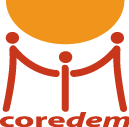The Scrutari software may predate the Coredem, but it has the same birthplace: a meeting in 1986 between the Charles Léopold Mayer Foundation for the Progress of Humankind (FPH) and the Ritimo network. This meeting resulted in the creation of DPH (Dialogues for Humanity) – at once a network, a methodology and a database of experience-sharing.
In the 1990s, much work was done within the DPH to address thesaurus indexing, and more specifically, on establishing a thematic-based thesaurus which pooled all contributions from DPH partners. At the time, DPH was still seen as a single database compiling all contributions.
The rise of the internet was to be game-changer, particularly with the appearance in the 2000s of cheap web hosting based on LAMP (Linux/Apache/MySql/PHP). These hosting services were to enable small organisations to easily set up databases adapted to their own contexts. Consequently, the DPH’s model of a single database with predetermined fields was inadequate up against the diversity that was now around.
In 2003, the FPH partnered with Exemole to upgrade its internal information system (monitoring records, agreements, grey literature, etc.) and create the prototype of a documentary resource website: ]Irénées->http://www.irenees.net/index_fr.html]. Thanks to the experience acquired through DPH, thesauruses formed a key part of the software that was then developed (now called BDF (“Base De Fiches”) – Document Database).
The need for a specific search engine was soon apparent. At this time, open source projects were in their infancy (Lucene created in 1999 became Apache Foundation’s flagship project in 2005). Indexing solutions for web pages (like Google) disregarded keyword indexing, their relevance algorithms remaining trade secrets.
Scrutari was thus created in late 2003. While being similar to the BDF document management software developed by the FPH and Exemole (Scrutari terminology is modelled on that of BDF), the Scrutari software was immediately seen as an independent software that was able to process data from multiple sources as long as they comply with the ScrutariData XML format.
Scrutari has been an integral part of the Coredem project when it was created in 2008. Having a search engine that could be shared by all those part of Coredem was a way of bringing unity and diversity together: unity in a search tool and diversity of resources.
Since then, the roadmap for Scrutari’s development has been greatly inspired by those involved in Coredem. Other than making suggestions, they are also the first to test out new developments.
 Community of Sites of Documentary Resources for a Global Democracy
Community of Sites of Documentary Resources for a Global Democracy



